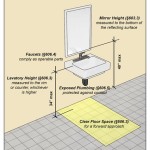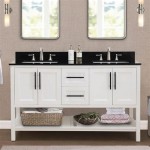How To Plumb A Bathroom In The Basement
Plumbing a bathroom in the basement involves several essential aspects that require careful planning and execution. These aspects are crucial in ensuring the bathroom's functionality, safety, and durability. In this article, we will explore the key considerations and steps involved in plumbing a basement bathroom, highlighting the importance of each aspect.
## Choosing the Right LocationThe location of the bathroom in the basement is crucial for both practical and aesthetic reasons. It should be easily accessible, well-ventilated, and have adequate space for fixtures and amenities. Consider factors such as proximity to existing plumbing lines, structural limitations, and the desired layout of the bathroom.
## Planning the Plumbing SystemPlanning the plumbing system is essential for ensuring the efficient and safe operation of the bathroom. This involves determining the layout of the plumbing lines, pipe sizing, and fixture placement. It is important to consider the location of drains, vents, and water supply lines, as well as the code requirements and limitations.
## Installing the Plumbing FixturesThe installation of plumbing fixtures is a critical step in completing the bathroom. This includes the toilet, sink, shower or bathtub, and any additional fixtures such as a vanity or bidet. It is important to follow the manufacturer's instructions and ensure that the fixtures are properly secured and leveled. Proper sealing and caulking are also essential to prevent leaks and ensure longevity.
## Connecting the Plumbing LinesOnce the fixtures are installed, the plumbing lines must be connected to the water supply and drainage system. This involves soldering or using compression fittings to join pipes, ensuring that all connections are secure and leak-proof. It is important to use the correct pipe materials and connectors for the specific application and to adhere to code requirements.
## Installing the VentsVents are essential for proper drainage and preventing clogs. They allow air to enter the drainage system, breaking the vacuum that can impede water flow. Vents should be installed according to code requirements, ensuring they are properly sized and connected to the appropriate drain lines.
## Pressure Testing the SystemOnce the plumbing system is complete, it is essential to pressure test it to check for leaks and ensure its functionality. This involves pressurizing the system with water and checking for any leaks or drops in pressure. Any leaks that are detected should be repaired immediately to prevent future problems.
## ConclusionPlumbing a bathroom in the basement requires careful planning and execution of essential aspects. By considering the location, planning the plumbing system, installing fixtures, connecting plumbing lines, installing vents, and pressure testing the system, you can ensure a well-functioning and durable bathroom. It is important to follow code requirements and seek professional assistance if needed to ensure safety and compliance.
How To Plumb A Basement Bathroom Diy Family Handyman

Basement Bathroom Plumbing Planning For A Below Grade Lavatory
How To Install A Bathroom In Basement Do You Handle The Plumbing For It Quora

Sewer Simulations Bathroom Plumbing Basement Shower

How To Finish A Basement Bathroom Pex Plumbing

Basement Toilet Pump Plumbing Inspections Internachi Forum

How To Diy Bathroom In Basement Without Breaking Concrete

Basement Bathroom Plumbing Below Sewer Level Design Small
Floor Broke Up Rough In Plumb For Basement Bath Diy Home Improvement Forum

A Basement Bathroom Renovation Merrypad







